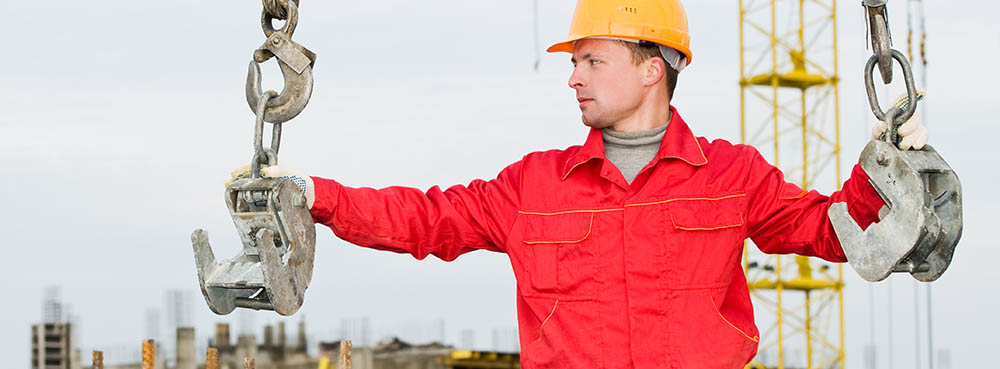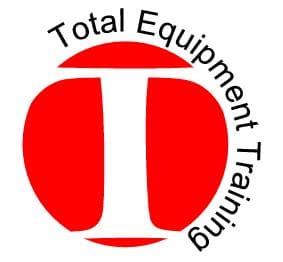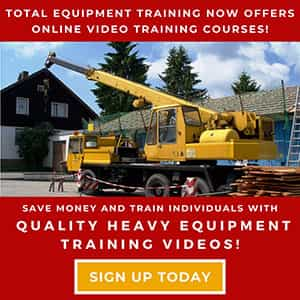Rigging Training

RIGGING QUALIFICATION TRAINING WITH TOTAL EQUIPMENT TRAINING
Total Equipment Training provides both OSHA Rigger Qualification and Rigger Certification through the National Commission for the Certification of Crane Operators (CCO). Our knowledgeable staff will help guide you to decide which program best suits your needs.
The training is designed to provide information, testing, and customized hands-on training to help ensure that participants are properly trained in rigging crane lifts safely and effectively in most situations. The hands-on portion of training is about 70% of the total allotted time for training. Below is a general training course outline.
Learn more about the CCO Rigger I Certification
OSHA RIGGING TRAINING PROGRAM OUTLINE
The Total Equipment Training Rigger class and hands on preparation consists of the following:
- OSHA and ANSI requirements
- Wire rope type and inspection
- Slings (nylon and steel)
- Center of gravity issues
- Types of rope damage
- Securing the load
- Calculating basic load weights, angles, and lifts
- Wire rope construction
- Mock rigging meeting
- Rigging hardware and accessories
- Safe rigging practices
- Knowing and understanding hand signals
- Unsafe conditions
- .
- .
| Course Description | Media | Book Now |
|---|---|---|
| Basic Rigging Training Covers pre-lift hazards, rope and sling inspections, types of rigging hitches, sling center of gravity, crane and hoist signals and more. (2 hrs) $99.95 | Basic Rigging Training | |
| Basic Rigging and Signalman (OSHA) Two courses in one which covers; introduction, load weights, angles, sling types, sling hitches, rigging hardware, communication and also two exams both practical and final for rigger signal. (3 hrs) $79.95 | Basic Rigging and Signalman (OSHA) | |
| Rigging and Slinging (Advanced) Covers pre-lift hazards, wire rope construction, rope and sling inspections, D/d ratios, hoist line installation, and crane and hoist signals. (4.5 hrs) $199.95 | Rigging and Slinging (Advanced) | |
| Intermediate Rigging Covers owner, operator, and supervisor responsibilities, types of rigging hitches, how to determine sling types, sizes, and configurations using sling capacity charts and more. (3.5 hrs) $149.95 | Intermediate Rigging | |
| Rigging Knowledge Verification: This exam covers the following topics: Eyebolts, hooks, plate clamps, rigging applications, calculations, shackles, rigging standards and helps identify poor rigging practices. (60 mins) $37.99 |
On-site OSHA Rigging Training Course
We Offer OSHA Compliant Rigging Training in the continental United States, including:
Delaware, Maryland, New Jersey, New York, Ohio, Pennsylvania, Texas, and Virginia
OSHA QUALIFIED RIGGER TRAINING
Employers must use qualified riggers during hoisting activities for assembly/disassembly work or whenever workers are within the fall zone and hooking, unhooking or guiding a load, or doing the initial connection of a load to a component or structure. We provide OSHA rigging qualification training by expert trainers to ensure you comply with OSHA guidelines.
Rigger I Qualification
Rigger Level I certification covers simple rigging tasks. The Load weight, center of gravity and rigging configuration are known to the rigger by way of on-the-job training or rigging experience. A qualified rigger should be able to inspect the rigging before each use, have knowledge of hitch configurations and capacities, know common hazards, be able to signal operations, and feel comfortable using several different kinds of rigging equipment and hitches.
Rigger II Qualification—OSHA Advanced Rigging
A Rigger Level II qualification has additional knowledge and skills to those of a certified Rigger Level I. A Level II Rigger is able to select rigging components based on a given rigging capacity. A qualified Rigger Level II should be able to estimate the load weight and configuration, identify lift points, select rigging based on loading, perform inspections, have knowledge of hitch configurations, rigging capacities, and load integrities, and understand hazards as well as the load dynamics. He/she should be able to complete these tasks unsupervised. Rigger Level IIs should also have some working knowledge of other equipment like hoists, winches, jacks, and industrial rollers.
OSHA defines the qualified rigger as “a person who possesses a degree, certificate or professional standing or has extensive knowledge, training, and experience, and can successfully demonstrate the ability to solve problems related to rigging loads.” It is up to the employers to determine whether a person is qualified to perform specific rigging tasks. Usually, this qualification is job or site-specific.
WHO IS A CCO CERTIFIED RIGGER?
Rigger Certification is for the experienced rigger who can demonstrate rigging knowledge related to all types of lifts. A rigger who receives certification through an accredited program, such as the CCO, has demonstrated he/she has the knowledge to perform rigging functions for all lifts (not specific to the site). Employers can be confident they are hiring an experienced rigger with CCO licensing.
A Rigger should be able to demonstrate or have knowledge of the following:
- Pre-use rigging inspection
- Identify and attach rigging with basic knowledge of hitch configurations, capacities, & basic knots
- Recognize associated hazards
- Signaling operations
- Use various types of rigging equipment and basic hitches and their applications
INTERESTED IN ON-SITE RIGGING TRAINING COURSE FOR YOUR EMPLOYEES?
Contact us today at (610) 321-2679 for more info on rigging certification. Our knowledgeable staff will provide you with the information you need and tailor a program to fit your needs and meet OSHA requirements.

